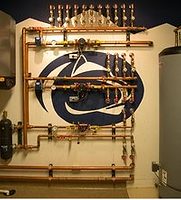Not just a bid

As a manufacturers’ rep, I get to see the best and the worst heating professionals the mountains of Colorado have to offer. I’d like to brag about some of my customers who do interesting things or excel in the trade. I’ll also anonymously acknowledge a few practices that can lead to trouble.
One of my favorite practices comes from American Plumbing Heating and Solar of Edwards, Colorado. During the bid process, they interview the homeowner. They ask questions about what type of system they want, and adjust their design to provide the comfort the homeowner wants. They go a step beyond the technical aspects of the system. They will ask the homeowner questions about where they are from and what professional or college sports teams they like.
After they are done with the mechanical room, they add a finishing touch: the logo of the homeowner’s favorite team is painted behind the piping (see photo). The painting doesn’t make the boiler perform any differently, but it shows that they were listening during the initial interview, and it highlights the attention to detail they put into their work.
Overall, any time you can talk to the end user before you bid or start a project, you have a better chance of meeting their expectations. In ski communities like the ones I am fortunate to work in, the comfort expectations are all over the board. Some homeowners want to feel hot air coming out of a register in their home, regardless of anything else in the world. Their expectations may not be met if you install a radiant heat system; even if it keeps them perfectly warm. They may be candidates for a second stage fan coil. They simply may not understand how radiant floors work if they have only had forced air previously. Either way, taking the time to get to know what comfort means to them will pays dividends.
Pete Cassidy at Par Mechanical of Montrose, Colorado, is another person who works well with homeowners. He builds trust in his initial interview with the client, so they feel confident that he knows what he is doing; he uses only the best products; and he will take care of his customer if something goes wrong. At every building we have visited together, Pete is greeted as a trusted advisor; not just the heating guy. Pete is what I like to call a "blank check" contractor. He will do the job right, and he will put every dollar you give him to good use.
Jerod Samuelson with HVAC Technical Services in Carbondale, Colorado, has a jobsite where he installed a floating hydro separator. He wanted to support the big vessel without hanging it from the ceiling or having stands jut out from the wall. He took the insulation jacket off the separator, used a grinder to scrape away the paint in a small area and welded a bracket to it. This way he could put a stand on the ground and hold the separator up without lots of supports under the pipe—like a big microphone on a stand. Was this the only way to properly support the separator? No. Was it a creative way to make the system look great without clogging up the room with supports? Absolutely. Some of my favorite plumbers are looking at the right function of the system, while keeping in mind the aesthetics of the mechanical space.
To have the best chance of making a homeowner happy with a retrofit project, recommend an energy audit. Having someone come in with a blower door and thermal camera to find leaky spots or missing insulation in a house will give you the best idea of what you are up against. If the living room of the house is always cold, and you replace the boiler with something new, they will expect their living room to be warm. But what if the core issue was that they didn't have enough insulation, and their undersized baseboard is full of dust and dirt? You can’t fix that from the mechanical room, but you can address it before it trips you up at the end of the job, if you identify it before you start.
Some contractors see energy auditors as competition for home improvement dollars. What if I recommend an audit and the owners spend a couple thousand dollars on insulation instead of paying me for a big new boiler? That is a risk you run by recommending an audit. They may even need a smaller boiler when they are done with other upgrades.
In the end, the advantages of an energy audit outweigh the risk of lost business. Recommending an audit establishes you as someone who is looking out for the customer’s best energy interests. The greatest overall product for a homeowner is a well-insulated, efficiently ventilated house, with a low temp boiler system—not a leaky building with a boiler that is oversized. Keep in mind insulation can’t fix broken machinery. That work will still be there for you, regardless of other upgrades. The advantage of recommending an audit is that you are helping the homeowners—inside or outside your scope of work—to maximize their energy and comfort dollar. That won’t be forgotten.
If the idea of suggesting an audit still doesn’t strike you as a good idea, keep it in-house by training one of your technicians to be an auditor. Overall building science training is always a good thing. Establish yourself as the energy expert, not the just the boiler guy.
Don’t keep the owners guessing about what you are doing. Document your progress. You can use apps like Evernote or Notability to keep track of your work. These apps let you send project updates and photos to the owners. If someone hires you to do a job and they see a "before" photo followed by photos documenting the steps you are taking, they will be less likely to be frustrated with your progress. I see contractors get into trouble when homeowners perceive their building is on the back burner, or if they aren’t seeing progress.
Always offer a premium option. Don’t assume someone is too poor or too cheap for the best. Give them at least a "better" and "best" option. People want to be comfortable in their homes; you have the power and knowledge to make that happen.
I watch systems get value engineered to the point that they won’t work well, or they don’t protect the new equipment very much. Don’t chase these jobs. If you are asked to take out components that protect your equipment simply to save cash, you will be on the hook five years from now when the heat exchanger is full of dirt. The owners won’t know or remember that the value engineering caused that.
You'll be in better shape if your bid is a reflection of your personality, not just a number. If the lowest price is the sole criteria to winning a general contractor’s business, don’t work for that builder. Work with people who value and appreciate you, not the bottom line. The contractors I mentioned in this article win jobs because they are talented, not because they are the least expensive.
Max Rohr has worked in the hydronics and solar industry for 10 years in the installation, sales and marketing sectors. Rohr is a LEED Green Associate and BPI Building Analyst, and is RPA’s ecducation committee chairman. He can be reached at max.rohr@mac.com.





